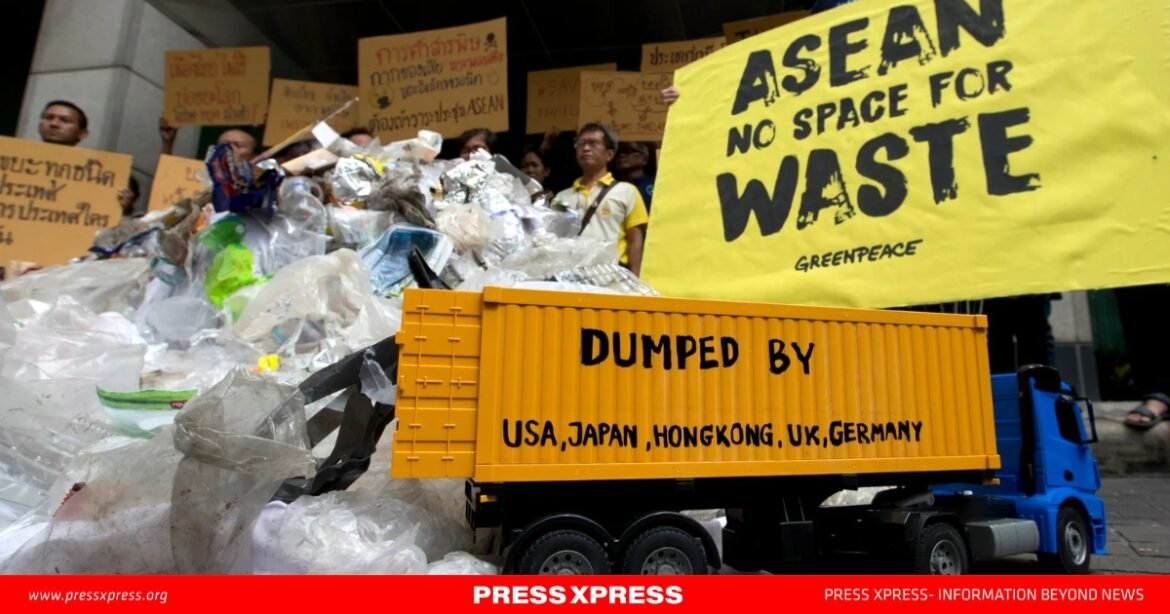Thailand has recently emerged as the latest nation to address the pressing issue of global plastic waste. Effective January 1, 2025, the country has banned the import of plastic waste, marking a significant shift in Southeast Asia’s role in managing the world’s waste exports. This decision reflects broader concerns about environmental degradation, public health risks, and the ethics of ‘waste colonialism’.
Why Did Thailand Ban Plastic Waste Imports?
Between 2018 and 2021, Thailand imported over 1.1 million tonnes of plastic waste, primarily from wealthier nations like the United States, Japan, and the UK. In 2023 alone, Japan exported 50,000 tonnes of plastic waste to Thailand. For these exporting countries, outsourcing waste management was a cost-effective way to meet recycling quotas. However, much of the imported waste was poorly managed in Thailand, with some facilities resorting to burning plastics, releasing harmful pollutants into the environment.

The environmental toll of this practice became increasingly evident, spurring local advocacy groups and international organizations like Greenpeace to demand action. In 2019, activists protested during the ASEAN summit in Bangkok, calling for a ban on plastic and electronic waste. Their efforts bore fruit when the Thai cabinet approved the Ministry of Natural Resources and Environment’s proposal for a ban in December 2024.
The ban reflects Thailand’s growing resolve to protect its environment and communities, but it also raises important questions about the ethics of the global waste trade.
The Economics of ‘Waste Colonialism’
At the heart of the issue lies a harsh economic reality. High-income nations often export their plastic waste to countries like Thailand because it is cheaper and more convenient than managing waste domestically. Processing waste in the Global South is less expensive due to lower labor costs, weaker environmental regulations, and favorable exchange rates.
For Western countries, the practice offers a convenient facade: they meet domestic recycling targets while shifting the environmental and social costs elsewhere. This dynamic has been dubbed “waste colonialism”—a term that encapsulates the exploitation of poorer nations as dumping grounds for the developed world’s refuse.
China’s 2018 ban on plastic waste imports was a pivotal moment in the global waste trade, forcing countries to redirect their exports. Thailand’s imports surged tenfold that year, highlighting how the burden shifted to other Southeast Asian nations with less stringent regulations. Critics argue that this perpetuates an unequal global system that prioritizes economic convenience over environmental justice.
Environmental and Health Impacts of Plastic Waste
The consequences of importing plastic waste are far-reaching. Much of the waste sent to Thailand and similar countries consists of mixed plastics, which are difficult to recycle. These materials are often burned or dumped, releasing toxic chemicals into the air, water, and soil. Communities near waste-processing facilities face increased risks of respiratory and cardiovascular diseases due to exposure to pollutants.
Microplastics add another layer of concern. These tiny particles, which result from the breakdown of larger plastic items, have infiltrated ecosystems worldwide. They are found in air, water, and even human tissues. Studies suggest microplastics take centuries to decompose fully, posing a long-term threat to biodiversity and human health.
A Global Issue with Unequal Burdens
Thailand is not alone in grappling with the plastic waste trade. Other Southeast Asian countries, such as Malaysia, Vietnam, and Indonesia, have also major importers. However, some are beginning to push back. Malaysia, for instance, has introduced stricter controls on waste imports, while Vietnam has implemented partial bans.
Even within the Global North, inequalities persist. For years, wealthier U.S. states have shipped waste to economically disadvantaged southern states where weaker regulations and lower land costs make disposal cheaper. This domestic version of waste colonialism mirrors the global dynamic, underscoring how economic and regulatory disparities shape waste management practices.
Steps Toward Accountability
Thailand’s decision to ban plastic waste imports is a step in the right direction, but it alone cannot solve the global plastic crisis. Activists and environmental experts are calling for systemic change. One proposed solution is a global treaty to address plastic production and waste management comprehensively.

In December 2024, however, UN-led talks in South Korea failed to produce such a treaty. While over 100 nations supported a draft agreement to reduce plastic production and phase out harmful chemicals, opposition from oil-producing nations stalled progress. The stakes are high: without coordinated global action, plastic production—currently at 400 million tonnes annually—will continue to rise, exacerbating environmental degradation and health risks.
The Path Forward
Thailand’s ban on plastic waste imports sends a strong message about the need for environmental responsibility. It challenges wealthier nations to reconsider their reliance on exporting waste and highlights the urgency of creating equitable global policies.
Yet, as activists warn, country-specific bans are only temporary fixes. Without a binding global framework, the waste trade will likely shift to other vulnerable nations, perpetuating the cycle of exploitation. The international community must prioritize the development of a treaty that addresses the root causes of plastic pollution, including overproduction and inadequate waste management systems.
Thailand’s move is both a victory and a reminder. It underscores the power of local action but also the necessity of global cooperation. Only by addressing the systemic inequities of the waste trade can we hope to achieve a sustainable and just future.


